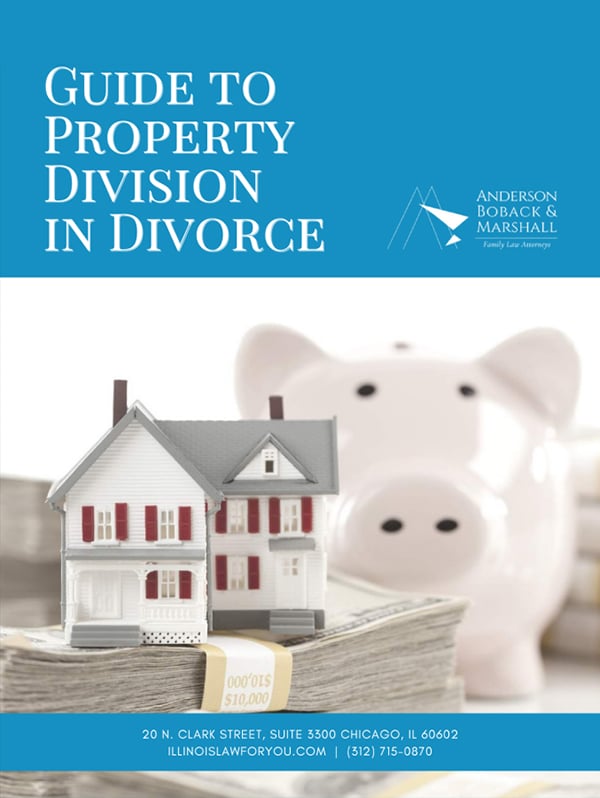A common question when parties are separating into two households is what should they do in regard to finding a new place to live. Divorcing spouses like to know if they have the option to purchase a home rather than rent a home.
This question is tricky because the answer to this can vary based upon the state a person resides in as well as how far along they are in the divorce process. For purposes of this article, we are discussing the rules regarding purchasing a home in Illinois during a divorce.
Will my spouse be entitled to 50% of a home purchased during the divorce proceedings?
All assets and property acquired during a marriage in Illinois, even if a divorce case is pending, is marital property and subject to division, no matter whose name the property is purchased in. This is very important to understand. Even if you buy a home in your own name, and you have a divorce case pending, you are presumed to be creating a marital property that is subject to a division.
Property Division Under Illinois Law
It is also important to understand in this analysis that Illinois is what is called an “equitable distribution” state. This means that Illinois is not a community property state or a state where marital property is presumed to be divided 50/50.
In Illinois, our Judges are free to award marital property to the parties based upon what they believe is equitable. In determining what an equitable distribution would be, the Court cannot consider items that would be attributed to “fault”. Meaning, a Court cannot consider a history of abuse or domestic violence when deciding what percentage of the property to award to a party.
The Court cannot “fault” someone for being a bad husband or wife, and then award them less property. Factors the Court may consider include income level currently, income history, projection of future income earning ability, education, age, health, history of employment during the marriage, and more.
Examples of Equitable Distribution in a Chicago Divorce
So, for example, let’s say a mother stays home for several years of marriage to raise children and forfeits her own career growth, while the other mother or husband goes to work and advances their career. The mother who stayed home to raise children will not likely “catch up” to the same income earning potential as the parent who worked because they lack those years of employment experience.
Or, say someone has a job earning significantly more than the other. The spouse who is at a disadvantage may be entitled to a larger distribution of marital property (perhaps 55% or 60% or even more) based upon these factors.
Key Considerations if You Purchase a Home in the Divorce Process
So, applying this to a home purchase, there are certain things to take into consideration. First, purchasing a home before a divorce is finalized creates additional marital property which is subject to division in the divorce.
All property acquired during a marriage is considered marital unless you can prove that it is non-marital. If it is purchased during the marriage in Illinois, even if you are only purchasing it in your own name, it is presumed to be marital property and will be divided. Further, depending upon your marital facts, the division may not be a 50/50 division, especially if there is a disparity as to health, education, income, employment history, or other factors, between you and your spouse.
So, not only will the marital property be divided, but your spouse could end up being awarded more than 50% of the value! That is certainly not anyone’s intended consequence in a divorce case. This is one of many reasons why it would be best to wait until after the divorce is finalized so that you are not creating additional marital property to divide.
What if we agree that I can buy a home while the divorce is pending?
Now, in certain circumstances, people do purchase homes during marriages while a divorce is pending, and they are fortunate if there is no arguing regarding dividing said property, because their spouse is certainly entitled to make an argument regarding that home purchase.
Sometimes the spouses will agree that one of them can purchase a home and that it will be awarded to them in their final divorce decree. In this situation, it is important that their agreement to that purchase be well-documented in a Court Order because people can change their minds.
How do I know what I would have to pay my spouse if I do purchase a home during divorce proceedings?
This question can often depend on many factors, including how much the down payment was, where the down payment came from, and the value of the home.
So, for example, if you put down twenty percent to purchase a home at a purchase price of $200,000, so, $40,000, and the rest of the purchase is through a mortgage, you only put out $40,000 in marital monies to buy it.
If the house’s value has not increased from the date of purchase to the date of divorce, then you’d pay your spouse whatever percentage of the $40,000 the Judge decides is equitable. It could be 50%, or $20,000, or it could be more or less. And, you can propose offsetting this sum with other assets, such as offering to take $20,000 less money from a joint savings account since you owe your spouse $20,000 from the home purchase anyway.
One issue which could arise is the house could increase in value from the date of the purchase to the date of the divorce. Let’s say using the same math that the house was purchase at $200,000 but now is worth $230,000 at the time of divorce. This property is marital, gains are also marital.
So, now you’d owe your spouse a percentage of the equity in the home at the current price. If you put $40,000 down, plus there is now an extra $30,000 in equity, there is now $70,000 that has to be divided between the two of you, and you’d, in theory, have to buy your spouse out of their percentage of the $70,000.
Perhaps your estate has other assets you could use to offset this additional equity. But, if it does not, you could be forced to sell the home in order to pay your spouse their share of the full equity. So, purchasing it for the purpose of living in it was all for nothing (except you did obtain some additional cash!).
Speak to a Chicago Divorce Attorney if You Want to Purchase a Home During Divorce
Purchasing a home during a divorce is tricky and there are plenty of unique factors that have to be considered in every situation.
No divorce case is the same and no scenario is the same, so if you are considering purchasing a home during divorce proceedings it is imperative that you speak to an experienced divorce attorney regarding the unintended consequences of this purchase and ways in which it can be done which would benefit you. Contact Anderson Boback & Marshall today to schedule a free consultation.
















